Akkermansia UK: Exploring the Benefits of This Probiotic Powerhouse
Introduction to Akkermansia
In the rapidly evolving landscape of gut microbiome research, few bacterial species have captured the attention of scientists and health enthusiasts quite like Akkermansia muciniphila. This remarkable microorganism, first identified in 2004, has emerged as one of the most promising probiotic candidates for supporting human health through its unique ability to maintain and strengthen the intestinal barrier while promoting overall gut ecosystem balance.
Akkermansia muciniphila represents a fascinating example of how our understanding of beneficial bacteria continues to expand beyond traditional probiotic species like Lactobacillus and Bifidobacterium. This gram-negative, oval-shaped bacterium has evolved a specialized niche within the human gut, where it performs crucial functions that directly impact our health, metabolism, and immune system response. Akkermansia muciniphila is naturally prevalent throughout the human gastrointestinal tract, being detected in individuals from infancy to old age.
The growing body of research surrounding Akkermansia has revealed its potential role in addressing some of the most pressing health challenges of our time, including obesity, diabetes, inflammatory bowel conditions, and metabolic dysfunction. Akkermansia is primarily found in the mucus layer of the digestive tract, where it contributes to mucin degradation and supports the balance of the gut microbiota. As we delve deeper into the science behind this bacterial powerhouse, it becomes clear that Akkermansia may represent a new frontier in personalized health optimization.
Understanding Akkermansia’s mechanisms of action and potential benefits provides valuable insights into the complex relationship between our gut microbiome and overall health. Akkermansia interacts closely with the gut lining, helping to maintain its integrity and supporting the regeneration of this crucial barrier. This knowledge empowers individuals to make informed decisions about supporting their gut health through targeted interventions that may include dietary modifications, lifestyle changes, and potentially, Akkermansia-based supplementation.
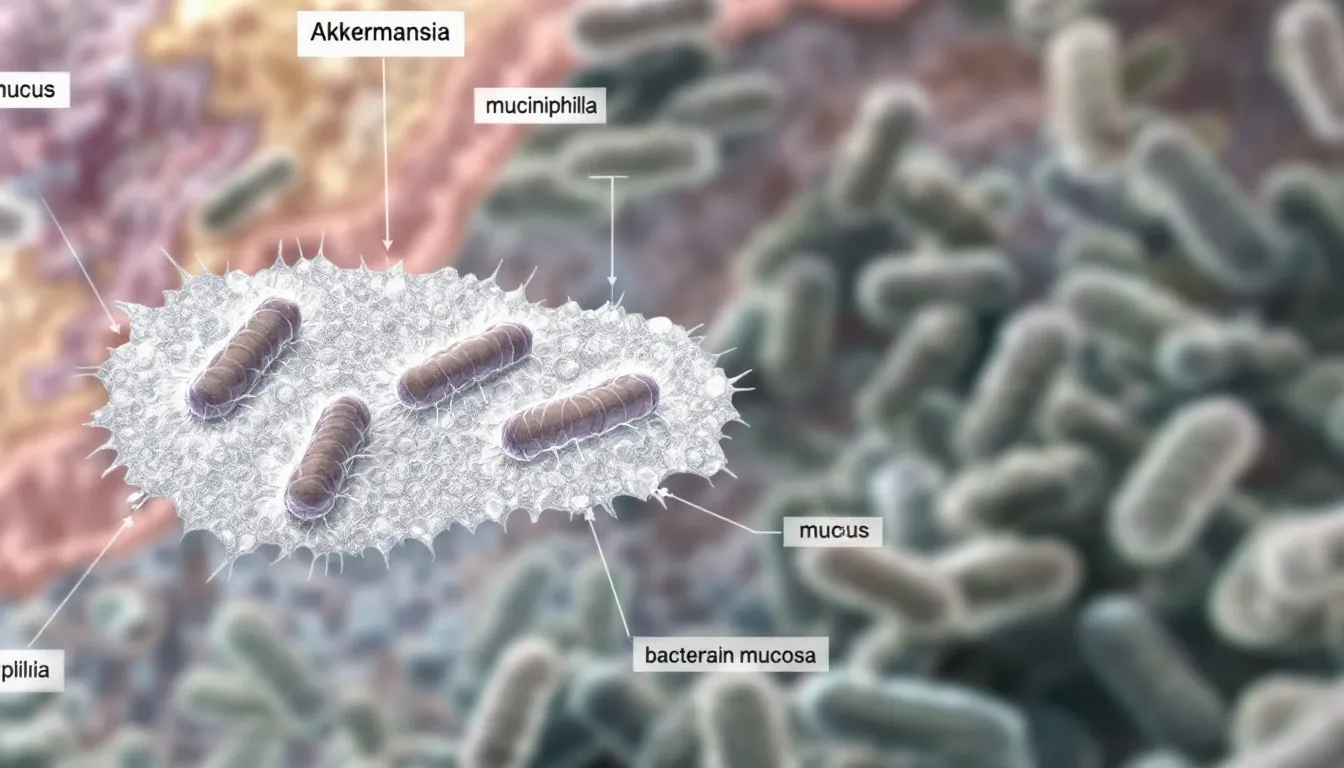
What is Akkermansia Muciniphila?
The Mucin-Degrading Specialist
Akkermansia muciniphila is a highly specialized bacterium that has evolved to thrive in the unique environment of the human large intestine, where it performs the remarkable function of degrading mucin, the primary protein component of the protective mucus layer that lines our intestinal walls. This mucin-degrading capability is not merely a survival strategy; it’s a sophisticated biological process that provides essential benefits to both the bacterium and its human host.
The name “muciniphila” literally translates to “mucin-loving,” reflecting this bacterium’s intimate relationship with the mucus layer that protects our intestinal epithelium. Unlike many other gut bacteria that primarily feed on dietary fiber and other plant-based compounds, Akkermansia has developed specialized enzymes that can break down the complex glycoproteins found in mucin, allowing it to access nutrients that are unavailable to most other microorganisms.
This unique metabolic capability positions Akkermansia as a keystone species within the gut microbiome, influencing the overall microbial ecosystem through its interactions with the intestinal environment. By continuously degrading and helping to renew the mucus layer, Akkermansia supports the dynamic balance between protection and permeability that is essential for optimal gut function. Additionally, Akkermansia muciniphila can influence mucus production, potentially enhancing the mucus barrier and contributing to host defense mechanisms.
The bacterium’s oval shape and relatively large size (compared to many gut bacteria) make it easily identifiable under microscopic examination, and its gram-negative cell wall structure provides it with specific characteristics that influence how it interacts with the immune system and other bacterial species within the gut environment.
Unique Ecological Niche
Akkermansia muciniphila occupies a distinctive ecological niche within the human gut microbiome, representing approximately 1-4% of the total bacterial population in healthy individuals. This relatively small percentage belies its significant impact on gut health and overall physiological function, demonstrating that microbial influence is not always proportional to abundance. Akkermansia is found not only in the large intestine but also in the small intestine, highlighting its presence throughout different parts of the gastrointestinal tract.
The bacterium’s primary residence in the mucus layer creates a unique position at the interface between the gut microbiome and the human host. This strategic location allows Akkermansia to influence both microbial community dynamics and host-microbe interactions, serving as a crucial mediator in the complex communication networks that govern gut health.
Unlike many gut bacteria that reside primarily in the intestinal lumen (the open space within the intestine), Akkermansia’s close association with the mucus layer means it has direct access to host-derived nutrients and can more readily influence the intestinal epithelial cells that line the gut wall. This proximity enables more intimate host-microbe interactions that can have far-reaching effects on immune function, inflammation, and metabolic processes.
The bacterium’s ability to thrive in the somewhat oxygen-rich environment near the intestinal wall, compared to the highly anaerobic conditions deeper in the gut, demonstrates its remarkable adaptability and specialized metabolic capabilities. This oxygen tolerance allows Akkermansia to occupy ecological niches that are unavailable to strictly anaerobic bacteria, contributing to its unique role within the gut ecosystem.
Metabolic Characteristics and Functions
The metabolic profile of Akkermansia muciniphila reveals a sophisticated biological system optimized for mucin degradation and the production of beneficial metabolites that support gut health. The bacterium produces a diverse array of enzymes, including glycosidases, proteases, and sulfatases, that work together to break down the complex structure of mucin into simpler compounds that can be utilized for energy and growth.
One of the most significant aspects of Akkermansia’s metabolism is its production of short-chain fatty acids (SCFAs), particularly acetate and propionate, which serve as important signaling molecules and energy sources for intestinal epithelial cells. The production of these SCFAs can have a significant effect on the gut environment by influencing pH and supporting the growth of beneficial bacteria. These SCFAs help maintain the slightly acidic environment that supports beneficial bacteria while inhibiting the growth of potentially harmful microorganisms.
The bacterium’s metabolic activities also contribute to the maintenance of the intestinal barrier function through the production of various bioactive compounds that support tight junction integrity and epithelial cell health. These metabolic products help strengthen the gut barrier, reducing the risk of increased intestinal permeability (often referred to as “leaky gut”) that has been associated with various health conditions.
Akkermansia’s unique metabolism also enables it to adapt to changes in mucin availability and composition, allowing it to maintain its population even during periods of dietary variation or gut microbiome disruption. This metabolic flexibility contributes to its role as a resilient and stabilizing presence within the gut ecosystem.
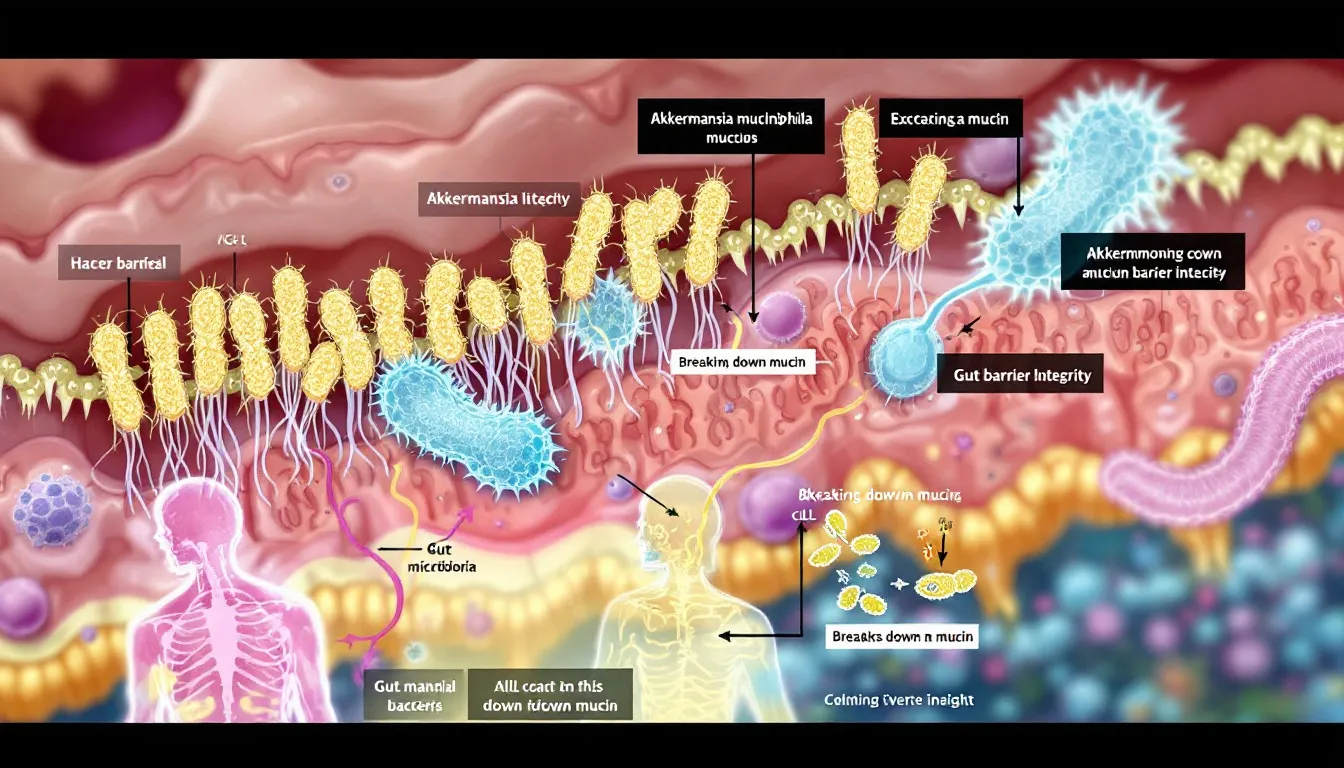
The Science Behind Akkermansia's Health Benefits
Gut Barrier Function and Intestinal Health
The relationship between Akkermansia muciniphila and gut barrier function represents one of the most well-documented and clinically significant aspects of this bacterium's health benefits. The gut barrier serves as a critical interface between the internal body environment and the external world, controlling what substances can pass from the intestinal tract into the bloodstream while maintaining protection against harmful pathogens and toxins.
Akkermansia supports gut barrier function through multiple mechanisms, beginning with its role in maintaining the mucus layer that serves as the first line of defense against potential threats. By continuously degrading and stimulating the renewal of mucin, Akkermansia helps ensure that this protective barrier remains robust and effective. The bacterium's metabolic activities also promote the production of antimicrobial peptides and other protective compounds that enhance barrier function.
Research has demonstrated that individuals with higher levels of Akkermansia in their gut microbiome tend to have better intestinal barrier integrity, as measured by various biomarkers of gut permeability. This improved barrier function has been associated with reduced inflammation, better immune function, and lower risk of developing autoimmune conditions and allergic reactions.
The bacterium's influence on tight junction proteins, which control the permeability of the intestinal epithelium, represents another crucial mechanism through which Akkermansia supports gut health. By promoting the expression and proper function of these proteins, Akkermansia helps maintain the selective permeability that allows beneficial nutrients to be absorbed while preventing harmful substances from entering the bloodstream.
Metabolic Health and Weight Management
The connection between Akkermansia muciniphila and metabolic health has emerged as one of the most exciting areas of research, with studies consistently showing inverse correlations between Akkermansia abundance and markers of metabolic dysfunction, including obesity, insulin resistance, and type 2 diabetes. This relationship suggests that Akkermansia may play a protective role against metabolic disorders through multiple interconnected mechanisms.
One of the primary ways Akkermansia influences metabolism is through its effects on inflammation and immune function. Chronic low-grade inflammation is recognized as a key driver of metabolic dysfunction, and Akkermansia's anti-inflammatory properties help address this underlying cause of metabolic problems. The bacterium produces various compounds that help regulate immune responses and reduce the production of pro-inflammatory cytokines that can impair insulin sensitivity and promote weight gain.
Akkermansia also influences metabolic health through its effects on gut hormone production and signaling. The bacterium's metabolic products can stimulate the release of hormones like GLP-1 (glucagon-like peptide-1) and PYY (peptide YY), which help regulate appetite, glucose metabolism, and insulin sensitivity. These hormonal effects contribute to better blood sugar control and may support healthy weight management.
The bacterium's role in maintaining gut barrier function also contributes to metabolic health by preventing the translocation of bacterial toxins (such as lipopolysaccharides) that can trigger inflammatory responses and interfere with normal metabolic processes. By strengthening the gut barrier, Akkermansia helps maintain the metabolic equilibrium necessary for optimal energy balance and glucose homeostasis.
Immune System Modulation
Akkermansia muciniphila exerts profound influences on immune system function through its strategic position at the gut-immune interface and its production of various immunomodulatory compounds. The bacterium's close association with the intestinal mucosa places it in direct contact with immune cells and tissues, allowing it to play an active role in shaping immune responses and maintaining immune homeostasis.
One of the key mechanisms through which Akkermansia influences immunity is its ability to promote the development and function of regulatory T cells (Tregs), which are crucial for maintaining immune tolerance and preventing excessive inflammatory responses. The bacterium produces specific metabolites and surface proteins that can interact with immune cells to promote anti-inflammatory responses while maintaining the ability to mount appropriate immune defenses when needed.
Research has shown that Akkermansia can help modulate the balance between Th1, Th2, and Th17 immune responses, promoting a more balanced and appropriate immune profile that reduces the risk of autoimmune conditions while maintaining effective pathogen defense. This immune-balancing effect is particularly important in the context of allergic diseases and inflammatory bowel conditions, where immune dysregulation plays a central role.
The bacterium's influence on the production of secretory IgA, the primary antibody found in mucosal secretions, represents another important immune-supportive function. By promoting adequate IgA production, Akkermansia helps strengthen the body's first line of immune defense at mucosal surfaces, reducing the risk of pathogen invasion and supporting overall immune resilience.
Cardiovascular Health Benefits
Emerging research has revealed significant connections between Akkermansia muciniphila and cardiovascular health, suggesting that this beneficial bacterium may help protect against heart disease and related conditions through multiple interconnected pathways. These cardiovascular benefits appear to stem from Akkermansia's broader effects on inflammation, metabolism, and gut barrier function, which collectively influence cardiovascular risk factors.
One of the primary mechanisms through which Akkermansia supports cardiovascular health is its anti-inflammatory effects. Chronic inflammation is recognized as a major driver of atherosclerosis and cardiovascular disease, and Akkermansia's ability to reduce systemic inflammation helps address this fundamental risk factor. The bacterium's metabolic products can help reduce the production of inflammatory markers that contribute to vascular damage and plaque formation.
Akkermansia also influences cardiovascular health through its effects on lipid metabolism and cholesterol levels. Research has shown that individuals with higher Akkermansia levels tend to have more favorable lipid profiles, including lower levels of harmful cholesterol and triglycerides. The bacterium's metabolic activities may influence the production and metabolism of cholesterol in ways that support cardiovascular health.
The connection between Akkermansia and blood pressure regulation represents another important cardiovascular benefit. The bacterium's effects on the gut-brain axis and its production of various bioactive compounds may help support healthy blood pressure levels through multiple mechanisms, including improvements in endothelial function and reduced arterial stiffness.
Factors Affecting Akkermansia Levels
Dietary Influences on Akkermansia Growth
The abundance and activity of Akkermansia muciniphila in the gut microbiome are significantly influenced by dietary factors, with certain foods and eating patterns either supporting or inhibiting this beneficial bacterium’s growth and function. Understanding these dietary relationships provides valuable insights for individuals seeking to optimize their Akkermansia levels through nutritional interventions.
Polyphenol-rich foods represent one of the most important dietary factors for supporting Akkermansia growth. These plant compounds, found abundantly in foods like berries, grapes, green tea, dark chocolate, and pomegranates, serve as prebiotics specifically for Akkermansia, providing the nutrients and signaling molecules that promote its growth and metabolic activity. Research has consistently shown that diets high in polyphenols correlate with higher Akkermansia levels and better gut health outcomes.
Dietary fiber, particularly certain types of soluble fiber, also plays a crucial role in supporting Akkermansia populations. While Akkermansia doesn’t directly feed on most dietary fibers like other gut bacteria, the presence of adequate fiber in the diet supports overall gut health and creates conditions that favor Akkermansia growth. The fermentation of fiber by other bacteria produces compounds that can benefit Akkermansia and support the overall gut ecosystem.
Fermented foods are another area of public interest for influencing the gut microbiome. While these foods are popular and thought to impact gut health, current scientific evidence regarding their ability to transfer beneficial microbes, such as Akkermansia, into the gut microbiome is limited and sometimes conflicting. Additionally, safety and variability in fermented foods should be considered.
Omega-3 fatty acids, found in fatty fish, flaxseeds, and walnuts, have been shown to promote Akkermansia growth while supporting the anti-inflammatory environment that this bacterium helps maintain. The relationship between omega-3s and Akkermansia appears to be bidirectional, with each supporting the beneficial effects of the other in promoting gut and systemic health.
In addition to dietary sources, the use of a food supplement containing live microorganisms is being explored as a strategy to support Akkermansia levels, though considerations around efficacy and safety remain important.
Lifestyle Factors and Environmental Influences
Beyond diet, various lifestyle and environmental factors significantly impact Akkermansia levels and activity within the gut microbiome. These factors demonstrate the complex interplay between our daily choices and the health of our microbial ecosystem, highlighting the importance of holistic approaches to gut health optimization.
Exercise and physical activity have been consistently associated with higher Akkermansia levels and better gut health outcomes. Regular physical activity appears to promote Akkermansia growth through multiple mechanisms, including improvements in gut motility, enhanced immune function, and the production of beneficial compounds that support gut health. The intensity and type of exercise may influence these effects, with moderate-intensity aerobic exercise showing particularly strong benefits.
Sleep quality and circadian rhythm regulation also influence Akkermansia populations, as disrupted sleep patterns and circadian misalignment can negatively impact gut microbiome diversity and the growth of beneficial bacteria. Maintaining consistent sleep schedules and ensuring adequate sleep duration supports the natural rhythms that govern gut microbiome function and Akkermansia activity.
Stress levels and stress management practices significantly impact Akkermansia through the gut-brain axis. Chronic stress can suppress beneficial bacteria growth while promoting the expansion of potentially harmful microorganisms. Stress reduction techniques such as meditation, yoga, and regular relaxation practices can help maintain the gut environment that supports Akkermansia thriving.
Environmental exposures, including antibiotic use, artificial sweeteners, and environmental toxins, can negatively impact Akkermansia levels. Antibiotics, while sometimes necessary for treating infections, can significantly reduce Akkermansia populations and may require targeted interventions to restore healthy levels after treatment.
Age and Health Status Considerations
Akkermansia levels naturally vary throughout life, with age-related changes in gut microbiome composition affecting this beneficial bacterium's abundance and activity. Understanding these age-related patterns helps inform targeted interventions for supporting Akkermansia across different life stages and health conditions.
During infancy and early childhood, Akkermansia levels are typically lower as the gut microbiome is still developing and establishing its mature composition. The introduction of solid foods and the gradual development of the intestinal mucus layer create conditions that support Akkermansia colonization, with levels generally increasing throughout childhood and reaching adult levels by adolescence.
In healthy adults, Akkermansia typically represents 1-4% of the total gut microbiome, but this percentage can vary significantly based on individual factors including genetics, diet, lifestyle, and overall health status. Some individuals naturally maintain higher Akkermansia levels, while others may need more targeted interventions to support optimal levels.
As individuals age, Akkermansia levels may decline along with overall gut microbiome diversity. This age-related decline in beneficial bacteria contributes to increased inflammation, reduced immune function, and higher susceptibility to age-related health conditions. Targeted interventions to support Akkermansia in older adults may help maintain better health outcomes and support healthy aging.
Various health conditions are associated with altered Akkermansia levels, with many chronic diseases characterized by reduced abundance of this beneficial bacterium. Conditions such as obesity, diabetes, inflammatory bowel disease, and cardiovascular disease often involve disrupted gut microbiome patterns that include decreased Akkermansia levels.
Clinical Research and Evidence
Human Studies and Clinical Trials
The clinical evidence supporting Akkermansia muciniphila’s health benefits continues to grow, with numerous human studies demonstrating the bacterium’s potential therapeutic applications and its associations with various health outcomes. These clinical investigations provide crucial evidence for translating laboratory findings into real-world health benefits for human populations. A recent clinical study investigated the safety, absorption, and excretion of pasteurized Akkermansia muciniphila in humans, further supporting its potential as a probiotic intervention. Additionally, animal studies using models such as mice and zebrafish have played a key role in understanding the mechanisms and therapeutic effects of Akkermansia, offering important preclinical insights.
One of the landmark studies in Akkermansia research was a randomized, double-blind, placebo-controlled trial that investigated the effects of Akkermansia supplementation in overweight and obese individuals with metabolic syndrome. Participants who received Akkermansia supplementation showed significant improvements in insulin sensitivity, reductions in inflammatory markers, and modest improvements in body composition compared to the placebo group. These findings provided important evidence for Akkermansia’s metabolic benefits in humans.
Cross-sectional studies have consistently found inverse correlations between Akkermansia abundance and markers of metabolic dysfunction, including body mass index, insulin resistance, and inflammatory markers. It has been noted that Akkermansia levels are inversely correlated with metabolic dysfunction, highlighting its potential role in metabolic health. These observational studies, while not proving causation, provide important evidence for the associations between Akkermansia levels and metabolic health across diverse populations.
Clinical studies in individuals with inflammatory bowel disease have shown that Akkermansia levels are often reduced during active disease phases and that restoration of Akkermansia populations may be associated with improved clinical outcomes. These findings suggest potential therapeutic applications for Akkermansia in managing inflammatory gut conditions.
Intervention studies examining the effects of polyphenol-rich foods and supplements on Akkermansia levels have consistently shown that these dietary interventions can increase Akkermansia abundance while improving various health markers. These studies provide practical evidence for dietary strategies that can support Akkermansia growth and associated health benefits. Furthermore, systematic review of the literature has evaluated the evidence for Akkermansia’s health benefits, helping to establish evidence-based conclusions for its use in clinical and dietary interventions.
Safety Profile and Regulatory Status
The safety profile of Akkermansia muciniphila has been extensively evaluated through both laboratory studies and human clinical trials, with findings consistently supporting its safety for human consumption when used appropriately. Akkermansia muciniphila is considered to have a low risk of adverse effects, making it a safe option within recommended dosages. This safety evidence has been crucial for regulatory approvals and the development of Akkermansia-based supplements and therapeutic products.
Toxicological studies have shown no adverse effects from Akkermansia supplementation at levels significantly higher than those typically used in human studies. The bacterium’s long evolutionary history as a commensal organism in the human gut provides additional evidence for its safety, as it represents a natural component of the healthy human microbiome rather than a foreign organism.
Clinical trials investigating Akkermansia supplementation have reported minimal side effects, with the most commonly reported effects being mild gastrointestinal symptoms such as bloating or changes in bowel movements that typically resolve as the gut microbiome adapts to the intervention. These mild effects are similar to those commonly observed with other probiotic supplements and are generally well-tolerated. It is important to evaluate the potential risks associated with Akkermansia supplementation, such as overconsumption or microbiological contamination, to ensure consumer safety.
Regulatory agencies in various countries have begun recognizing Akkermansia’s potential as a beneficial probiotic, with some jurisdictions granting novel food status or similar regulatory approvals that allow for its use in dietary supplements and functional foods. The regulatory landscape continues to evolve as more evidence becomes available and manufacturing processes are refined.
Special consideration is given to immunocompromised individuals and those with severe underlying health conditions, as with any probiotic supplement. Healthcare provider consultation is recommended for these populations to ensure appropriate use and monitoring.
Comparative Effectiveness Studies
Research comparing Akkermansia muciniphila to other probiotic strains and interventions has provided valuable insights into its unique benefits and optimal applications. These comparative studies help establish Akkermansia's position within the broader landscape of gut health interventions and guide clinical decision-making.
Studies comparing Akkermansia supplementation to traditional probiotic strains like Lactobacillus and Bifidobacterium have shown that while all beneficial bacteria provide health benefits, Akkermansia's unique mechanisms of action offer distinct advantages for certain health conditions, particularly those related to gut barrier function and metabolic health.
Comparative effectiveness research has also examined how Akkermansia supplementation compares to dietary interventions, such as increased fiber intake or polyphenol consumption. These studies suggest that while dietary approaches can effectively increase Akkermansia levels, direct supplementation may provide more rapid and pronounced effects in certain populations.
Head-to-head comparisons between different Akkermansia formulations and delivery methods have revealed important insights about optimal dosing, timing, and formulation strategies. These studies have shown that live versus pasteurized Akkermansia preparations may have different effects, with both showing benefits but through potentially different mechanisms.
Long-term comparative studies are examining how Akkermansia interventions compare to conventional medical treatments for conditions like metabolic syndrome and inflammatory bowel disease. While these studies are ongoing, early results suggest that Akkermansia may serve as a valuable adjunctive therapy that enhances the effectiveness of conventional treatments.
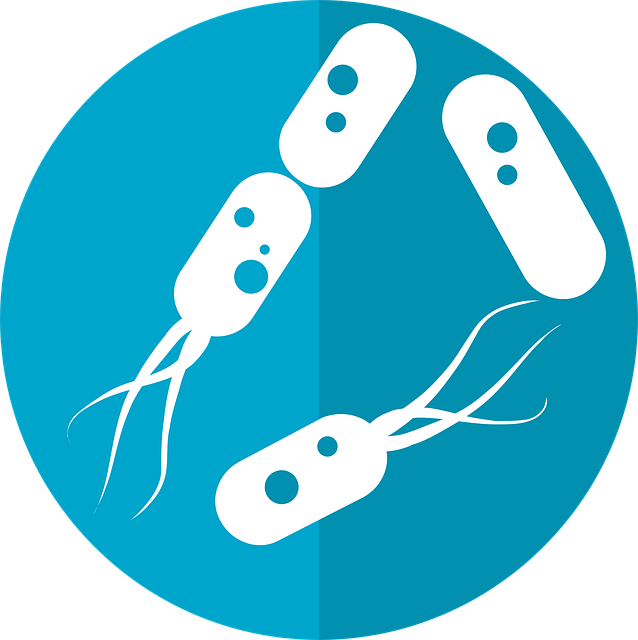
Akkermansia Supplementation in the UK
Current Availability and Regulatory Landscape
The availability of Akkermansia muciniphila supplements in the UK market reflects the evolving regulatory landscape surrounding novel probiotic strains and the growing consumer interest in advanced gut health interventions. Understanding the current regulatory status and market availability helps consumers make informed decisions about accessing Akkermansia-based products.
In the UK, Akkermansia supplements fall under the regulatory framework governing food supplements and novel foods, administered by the Food Standards Agency (FSA) and other relevant authorities. The regulatory process for new probiotic strains involves extensive safety evaluation and documentation of manufacturing processes to ensure consumer safety and product quality.
Several companies have received regulatory approval to market Akkermansia supplements in the UK, offering various formulations including capsules, powders, and combination products that include other beneficial bacteria strains. Some products specifically use the akkermansia muciniphila muct strain, which has been studied for its safety and efficacy. These products must comply with strict labeling requirements and quality standards to ensure consumer safety and accurate product information.
The UK market for Akkermansia supplements continues to evolve, with new products and formulations regularly entering the market as research evidence grows and manufacturing processes improve. Some supplements use heat inactivated Akkermansia muciniphila to enhance stability and safety, making them suitable for use in food supplements and medical foods. Consumer access to these products has expanded significantly, with availability through online retailers, specialty health stores, and some pharmacy chains.
Healthcare providers in the UK are increasingly aware of Akkermansia’s potential benefits, with some practitioners incorporating these supplements into comprehensive gut health protocols for patients with specific health conditions. This growing professional awareness has contributed to increased consumer education and appropriate use of these advanced probiotic products.
Product Selection and Quality Considerations
Selecting high-quality Akkermansia supplements requires understanding the various factors that influence product effectiveness, safety, and value. The UK market offers diverse product options, making informed selection crucial for achieving optimal health benefits while ensuring safety and cost-effectiveness.
One of the most important considerations in Akkermansia supplement selection is the viability and potency of the bacterial strains included in the product. Look for products that specify the number of colony-forming units (CFUs) and provide information about strain viability through the product's shelf life. Some products use pasteurized Akkermansia, which may offer different benefits compared to live bacteria preparations.
Manufacturing quality and testing protocols represent crucial factors in product selection. Choose products from companies that employ third-party testing, maintain Good Manufacturing Practice (GMP) standards, and provide transparent information about their production processes. These quality assurance measures help ensure product safety, potency, and consistency.
Storage requirements and stability are important practical considerations, as Akkermansia products may require refrigeration or have specific storage conditions to maintain bacterial viability. Understanding these requirements helps ensure that products maintain their effectiveness throughout their shelf life and provides guidance for proper home storage.
Product formulations vary significantly, with some including additional prebiotic compounds, other probiotic strains, or supportive nutrients that may enhance Akkermansia's benefits. Consider whether these additional ingredients align with your health goals and whether they provide added value or potential interactions that should be considered.
Integration with Healthcare Providers
Working with qualified healthcare providers when considering Akkermansia supplementation can help ensure appropriate use, optimal outcomes, and safe integration with existing health management strategies. The UK healthcare system provides various opportunities for professional guidance and monitoring when using advanced probiotic interventions.
Many functional medicine practitioners, nutritional therapists, and some conventional healthcare providers in the UK have experience with Akkermansia supplementation and can provide valuable guidance on appropriate use, dosing, and monitoring. These professionals can help assess individual needs and determine whether Akkermansia supplementation is appropriate for specific health conditions or goals.
Integrating Akkermansia supplementation with existing medical treatments requires careful consideration and professional oversight, particularly for individuals with chronic health conditions or those taking medications that might interact with probiotic supplements. Healthcare providers can help coordinate these interventions and monitor for potential interactions or adverse effects.
Monitoring and assessment protocols can help track the effectiveness of Akkermansia supplementation and guide ongoing treatment decisions. Some healthcare providers offer specialized testing to assess gut microbiome composition and track changes in Akkermansia levels following supplementation, providing valuable feedback for optimizing interventions.
The growing body of evidence supporting Akkermansia's benefits has led to increased integration of these supplements into comprehensive health management protocols, with healthcare providers increasingly recognizing their potential value as part of holistic approaches to gut health and metabolic wellness.

Practical Applications and Recommendations
Dosing and Administration Guidelines
Determining appropriate dosing for Akkermansia muciniphila supplementation involves considering multiple factors including individual health status, specific health goals, product formulation, and current research evidence. While optimal dosing protocols continue to evolve as research progresses, current evidence provides guidance for safe and effective use.
Most clinical studies have used daily doses ranging from 10^9 to 10^10 CFUs (colony-forming units) of live Akkermansia bacteria, administered as single daily doses or divided into multiple doses throughout the day. These dosing ranges have shown effectiveness for various health outcomes while maintaining good safety profiles across diverse populations.
The timing of Akkermansia supplementation can influence its effectiveness, with some evidence suggesting that taking supplements with meals may improve bacterial survival through the acidic stomach environment. However, specific timing recommendations may vary based on product formulation and individual factors such as stomach acid production and digestive health status.
Duration of supplementation appears to be important for achieving optimal benefits, with most studies showing continued improvements over supplementation periods of 8-12 weeks or longer. Some individuals may experience benefits sooner, while others may require longer supplementation periods to achieve noticeable improvements in health markers.
Individual variation in response to Akkermansia supplementation means that some people may require dosing adjustments based on their response and tolerance. Starting with lower doses and gradually increasing can help minimize potential side effects while allowing the gut microbiome to adapt to the intervention.
Combining with Other Interventions
Akkermansia supplementation often proves most effective when combined with other gut health interventions that support its growth and amplify its beneficial effects. Combining Akkermansia supplementation with other probiotics may further enhance gut microbiota modulation, restore microbial balance, and improve overall health outcomes. Understanding how to integrate Akkermansia with dietary, lifestyle, and other therapeutic interventions can help maximize health outcomes while creating synergistic benefits.
Dietary combinations that support Akkermansia include increasing intake of polyphenol-rich foods, which serve as prebiotics specifically for this beneficial bacterium. Foods like berries, green tea, dark chocolate, and pomegranates can be strategically included in the diet to support Akkermansia growth while providing additional health benefits through their antioxidant and anti-inflammatory properties.
Fiber supplementation, particularly with specific types of prebiotic fibers, can create a more favorable environment for Akkermansia while supporting overall gut microbiome diversity. However, it’s important to introduce fiber gradually to avoid digestive discomfort and to choose fiber types that complement rather than compete with Akkermansia’s nutritional needs.
Exercise programs that include regular moderate-intensity physical activity can enhance the benefits of Akkermansia supplementation through multiple mechanisms including improved gut motility, enhanced immune function, and increased production of beneficial metabolites that support gut health.
Stress management interventions such as meditation, yoga, or other relaxation techniques can support the gut environment necessary for Akkermansia thriving while addressing stress-related factors that can negatively impact gut microbiome health.
Monitoring Progress and Outcomes
Tracking the effectiveness of Akkermansia supplementation helps guide ongoing treatment decisions and provides valuable feedback about individual responses to intervention. Various monitoring approaches can provide insights into both short-term effects and longer-term health improvements.
Subjective symptom tracking can provide valuable insights into how Akkermansia supplementation affects digestive health, energy levels, mood, and other health parameters. Keeping a daily health journal that tracks symptoms, energy levels, digestive function, and overall well-being can help identify patterns and improvements over time.
Objective health markers that can be monitored include inflammatory markers (such as C-reactive protein), metabolic markers (including glucose and insulin levels), and lipid profiles. These laboratory tests can provide quantitative evidence of health improvements and help guide ongoing treatment decisions.
Gut microbiome testing, while not always necessary, can provide direct evidence of changes in Akkermansia levels and overall microbiome composition following supplementation. These tests can be particularly valuable for individuals with complex health conditions or those who want detailed feedback about their gut health interventions.
Body composition and weight changes may occur gradually over time with Akkermansia supplementation, particularly in individuals with metabolic concerns. Regular monitoring of weight, body fat percentage, and waist circumference can help track progress toward metabolic health goals.
Sleep quality, stress levels, and mood improvements are often reported with successful Akkermansia supplementation, reflecting the bacterium's influence on the gut-brain axis. Tracking these parameters using standardized questionnaires or daily ratings can provide insights into broader health improvements beyond gut health.

Future Directions and Research
Emerging Applications and Research Areas
The field of Akkermansia research continues to expand rapidly, with new applications and research areas emerging as our understanding of this remarkable bacterium deepens. These emerging research directions hold promise for novel therapeutic applications and enhanced understanding of human health optimization through microbiome modulation.
Personalized medicine approaches incorporating Akkermansia represent one of the most exciting frontiers in microbiome research. Scientists are investigating how individual genetic variations, existing microbiome composition, and lifestyle factors influence responses to Akkermansia supplementation, with the goal of developing personalized protocols that optimize outcomes for each individual.
The potential applications of Akkermansia in mental health and neurological conditions are gaining significant research attention, as scientists explore the gut-brain axis connections that link gut microbiome health to cognitive function, mood regulation, and neurological wellness. Early research suggests that Akkermansia may influence neurotransmitter production and neuroinflammation in ways that could benefit various mental health conditions.
Cancer research is exploring Akkermansia's potential role in cancer prevention and treatment support, with studies investigating how this beneficial bacterium might influence immune function, inflammation, and other factors that affect cancer risk and treatment outcomes. The bacterium's immune-modulating properties make it a particularly interesting candidate for supporting cancer immunotherapy effectiveness.
Aging research is examining how Akkermansia levels and function change throughout the lifespan and whether targeted interventions to support this bacterium can help promote healthy aging and longevity. The connections between Akkermansia, inflammation, and age-related health decline make this an particularly promising area for developing interventions that support healthy aging.
Technological Advances and Innovation
Technological innovations in Akkermansia research and product development continue to advance our ability to study, cultivate, and deliver this beneficial bacterium for human health applications. These technological advances promise to improve product effectiveness, expand accessibility, and enhance our understanding of optimal application strategies.
Advanced cultivation and manufacturing techniques are improving the stability, viability, and cost-effectiveness of Akkermansia supplements. New fermentation technologies and preservation methods are enabling the production of more stable products with longer shelf lives and better bacterial viability, making Akkermansia supplementation more accessible and effective.
Delivery system innovations are focusing on improving the survival of Akkermansia bacteria through the harsh stomach environment and ensuring optimal colonization in the gut. Encapsulation technologies, enteric coatings, and other delivery innovations are being developed to maximize the effectiveness of Akkermansia supplementation.
Diagnostic and monitoring technologies are advancing our ability to assess Akkermansia levels and track responses to supplementation. Improved gut microbiome testing methods, biomarker assessments, and real-time monitoring technologies are making it easier to personalize Akkermansia interventions and track their effectiveness.
Artificial intelligence and machine learning applications are being developed to analyze complex microbiome data and identify optimal intervention strategies for individuals based on their unique microbiome profiles, health status, and response patterns. These technologies promise to enhance the precision and effectiveness of Akkermansia-based interventions.

Global Health Implications
The potential global health implications of Akkermansia research and supplementation are significant, particularly in addressing the rising prevalence of metabolic diseases, inflammatory conditions, and age-related health challenges that affect populations worldwide. Understanding these broader implications helps contextualize the importance of continued Akkermansia research and development.
The global obesity and diabetes epidemics represent major health challenges that could potentially be addressed through Akkermansia-based interventions. The bacterium’s demonstrated effects on metabolism, inflammation, and gut barrier function suggest that widespread Akkermansia supplementation could contribute to population-level improvements in metabolic health outcomes. In addition to Akkermansia supplementation, faecal microbiota transplantation is being explored as a global intervention to restore gut microbiome diversity and treat specific conditions, such as C. difficile infections and ulcerative colitis. Fecal microbiota transplantation is another approach under investigation for modifying the gut microbial composition to confer health benefits, with ongoing research and clinical trials evaluating its safety, regulation, and broader applications.
Healthcare cost reduction represents another significant potential benefit, as preventive interventions that support gut health and reduce the risk of chronic diseases could help reduce healthcare costs and improve quality of life for millions of people. The relatively low cost and good safety profile of Akkermansia supplementation make it an attractive option for large-scale health interventions.
Global health disparities in access to advanced healthcare interventions could potentially be addressed through affordable, accessible Akkermansia supplementation programs. The bacterium’s benefits for basic health parameters like immune function and gut health could provide significant value in populations with limited access to conventional medical care.
Environmental and sustainability considerations are increasingly important in probiotic development, with researchers working to develop sustainable production methods for Akkermansia that minimize environmental impact while maintaining product quality and accessibility.
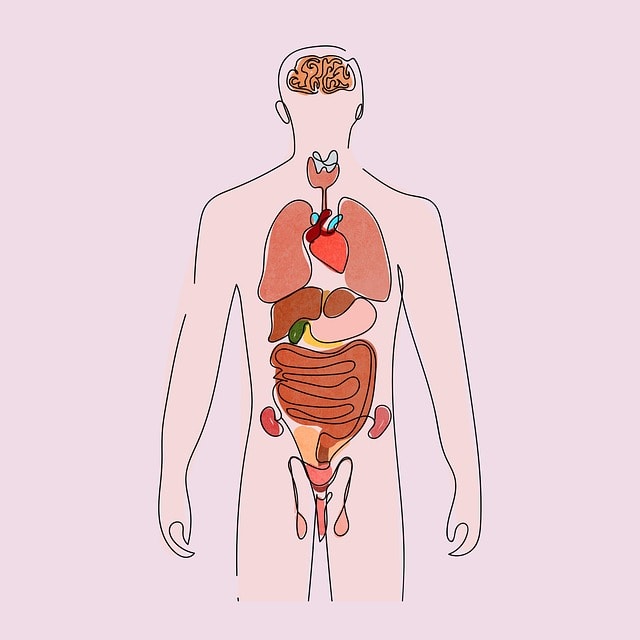
Conclusion: The Promise of Akkermansia for Human Health
The remarkable journey of Akkermansia muciniphila from a recently discovered gut bacterium to a promising therapeutic target represents one of the most exciting developments in modern microbiome research. The growing body of evidence supporting its benefits for gut health, metabolic function, immune system regulation, and overall wellness positions Akkermansia as a powerful tool for optimizing human health through microbiome modulation.
The unique characteristics that set Akkermansia apart from other probiotic bacteria—its specialized ability to maintain and strengthen the intestinal barrier, its production of beneficial metabolites, and its strategic position within the gut ecosystem—make it particularly valuable for addressing the complex health challenges of modern life. From supporting metabolic health in an era of rising obesity and diabetes to strengthening immune function in increasingly challenging environmental conditions, Akkermansia offers multi-faceted health benefits that address root causes rather than just symptoms.
The clinical evidence supporting Akkermansia's safety and effectiveness continues to grow, providing healthcare providers and consumers with increasing confidence in its therapeutic potential. The availability of high-quality Akkermansia supplements in the UK market, combined with growing healthcare provider awareness and support, creates opportunities for individuals to access these benefits as part of comprehensive health optimization strategies.
Looking toward the future, the potential applications of Akkermansia research and supplementation extend far beyond current understanding, with emerging research areas promising to unlock new therapeutic possibilities and refine our approaches to personalized gut health optimization. The integration of advanced technologies, personalized medicine approaches, and global health initiatives suggests that Akkermansia may play an increasingly important role in promoting human health and wellness worldwide.
For individuals considering Akkermansia supplementation, the current evidence supports its potential as a valuable tool for supporting gut health, metabolic function, and overall wellness when used appropriately as part of a comprehensive health management strategy. Working with qualified healthcare providers, choosing high-quality products, and maintaining realistic expectations about outcomes can help ensure safe and effective use of this promising probiotic intervention.
The story of Akkermansia muciniphila illustrates the incredible potential that lies within our own microbiome for supporting health and preventing disease. As research continues to uncover new aspects of this remarkable bacterium's capabilities, we move closer to realizing the full potential of microbiome-based approaches to human health optimization, with Akkermansia leading the way as a true probiotic powerhouse for the future of personalized wellness.
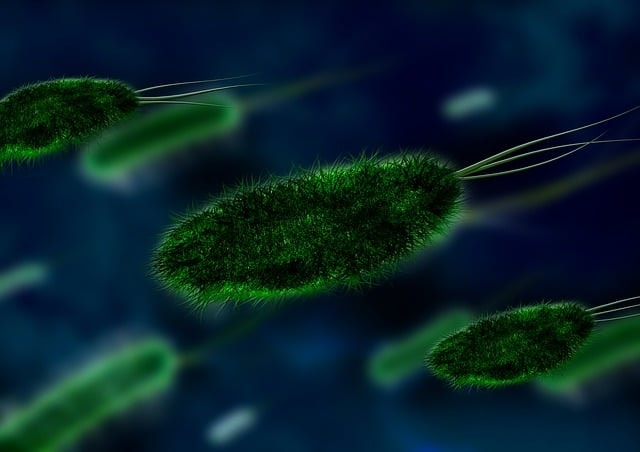
Connection to Diseases
As someone who has spent decades nurturing people's wellness journeys, I'm deeply fascinated by how research into our precious gut microbiome continues to reveal the remarkable healing potential of Akkermansia muciniphila—this wonderful little guardian that has captured my heart as a true ally in our pursuit of natural health. Through my years of guiding clients toward holistic wellness, I've witnessed firsthand how this nurturing bacterium, working in beautiful harmony with our gut's delicate ecosystem and intestinal lining, holds such promising therapeutic gifts for those seeking natural support for metabolic imbalances, inflammatory conditions, autoimmune challenges, neurological concerns, and even certain forms of cancer. What fills me with hope is how researchers are gently uncovering the profound ways this beneficial microbe can become part of our individualized healing journey, and I'm excited to share with you the latest heartening discoveries about Akkermansia's role in supporting our body's innate wisdom across these various health challenges.

Akkermansia and Metabolic Disorders
Akkermansia muciniphila has truly captured the hearts of those of us passionate about natural wellness, particularly for its remarkable healing potential in supporting people struggling with metabolic challenges like obesity and type 2 diabetes. Research studies with animal models have beautifully demonstrated that nurturing higher levels of this beneficial bacterium in our gut can blossom into improved glucose balance, reduced insulin resistance, and even gentle, sustainable weight loss. These wonderful benefits seem to flow naturally from Akkermansia's gentle ability to strengthen our gut's protective barrier, calm systemic inflammation throughout the body, and harmoniously balance our entire gut microbiome community.
One of the most fascinating pathways involves this caring bacterium's production of short chain fatty acids (SCFAs), which serve as both nourishing energy for our bodies and gentle regulators that help maintain healthy glucose balance and support our overall metabolic wellness. In both animal research and human studies, we've discovered that individuals facing metabolic challenges such as obesity and diabetes often carry lower levels of Akkermansia muciniphila in their gut microbiome - almost as if their inner ecosystem is calling out for this healing presence. Thoughtful supplementation with this beneficial bacterium has been lovingly linked to improvements in glucose tolerance and insulin sensitivity, suggesting a direct and profound impact on our metabolic wellbeing.
While these discoveries truly highlight the therapeutic promise that Akkermansia holds for supporting those facing metabolic disorders, I always encourage patience and continued learning, as we need more research to fully understand the most effective ways to harness its gifts for human healing. Ongoing studies continue to explore how Akkermansia supplementation, mindful dietary changes, and other holistic interventions can be woven together to support and empower individuals on their journey with obesity, diabetes, and related wellness challenges.

Links to Inflammatory and Autoimmune Diseases
You know, when I think about the beautiful ways our bodies can heal naturally, Akkermansia muciniphila truly warms my heart as one of nature's most nurturing helpers. This wonderful little bacterium goes far beyond supporting our metabolism - it's like having a gentle guardian that naturally soothes inflammation and helps our immune system find its perfect balance. For those dear souls dealing with inflammatory and autoimmune challenges, this could be such a blessing. When we look at inflammatory bowel conditions like Crohn's disease and ulcerative colitis - conditions that can cause such suffering - we've learned that disruptions in our gut's delicate ecosystem often play a role. The research using animal studies has shown me such hope: when we lovingly support our bodies with Akkermansia, we can actually calm that gut inflammation, strengthen our precious intestinal barriers, and bring relief to those painful IBD symptoms.
What really fills me with joy is seeing how human studies are confirming what my heart already knew to be true. Clinical trials are showing us that when people with IBD are gently supported with Akkermansia muciniphila, their symptoms can improve and their quality of life can truly flourish. It's like watching a garden come back to life with the right care. This remarkable bacterium's gift for helping our immune responses find harmony and creating a balanced gut environment is now being explored for autoimmune conditions like multiple sclerosis too. The early evidence just touches my soul - it suggests that Akkermansia's natural ability to support our body's own healing wisdom could help prevent or slow down these challenging diseases by reducing that harmful inflammation and nurturing our body's innate regulatory gifts.
As I continue to follow this research with such excitement, Akkermansia muciniphila stands out to me as one of nature's most precious allies. It has the potential to completely transform how we lovingly approach chronic inflammatory and autoimmune conditions - both through gentle supplementation and by embracing broader, holistic strategies that honor and support our miraculous gut microbiota. This is the kind of natural healing that speaks to everything I believe about empowering our bodies to thrive.

Emerging Evidence in Neurological and Other Conditions
The beautiful influence of Akkermansia muciniphila reaches far beyond our gut, and I'm genuinely excited about the emerging research that's revealing its wonderful potential for supporting our neurological health and helping prevent other serious health concerns. You know, the gut-brain connection—this amazing communication network between our gut bacteria and our nervous system—has become such a heartening focus in studies looking at conditions like Alzheimer's and Parkinson's disease. What's truly encouraging is that animal studies have shown how Akkermansia supplementation can offer neuroprotective benefits, naturally enhancing cognitive function and gently reducing harmful inflammation in the brain.
Beyond these neurological gifts, I'm deeply moved by how Akkermansia muciniphila is being studied for its caring impact on cardiovascular health and colorectal cancer prevention. Its natural anti-inflammatory properties and gentle ability to maintain our gut's protective barrier truly warm my heart as they may help reduce risk factors that contribute to these conditions. For instance, by lovingly supporting a healthy intestinal mucus layer and preventing harmful substances from crossing where they shouldn't, this beneficial bacterium may naturally lower the risk of chronic inflammation that can lead to heart disease and certain cancers.
Overall, the growing body of research fills me with such hope as it highlights the precious role of Akkermansia muciniphila in nurturing gut health and its far-reaching, positive effects throughout our entire body. While the healing potential of this remarkable bacterium is truly promising, I believe we need continued research to fully understand how it works its magic and to develop thoughtful, targeted approaches for supporting various health conditions. As our understanding deepens, Akkermansia continues to represent a beautiful beacon of hope for innovative, natural microbiome-based approaches to wellness and disease prevention that honor our body's innate wisdom.









